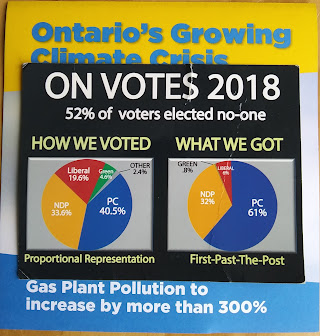The Cancer of Voter Inequality is part of a Fatal Mix
Fair Vote Canada links to research
showing that countries with an electoral system based on proportional representation act faster on
climate change, score higher on Yale’s Environmental Performance Index,
and have made 117% greater use of renewable sources of energy.
The climate crisis is now the most frightening symptom of the ongoing massive political crisis that gave rise to it and that underpins it at its root. One of the main sources of that “root rot” in Canada, both federally and provincially, is an electoral system based on false majorities and voter inequality.
For many decades our deception-riddled electoral system has been undermining our attempts to hold elections that try to uphold even the most basic of democratic principles: the principle of “majority rules.” For far too long we have mislead ourselves by using the phrase, “majority government” to refer to a government that has won a majority of seats instead of a majority of votes from actual people. Every time we use that phrase we only pretend that we’ve treated every voter as equal, and we’re misleading ourselves away from a truly representative democracy.
Our society accepting this as a norm has become like a human body that makes space for, and accommodates, a growing cancerous tumour.
But like all cancerous tumours that are accommodated for too long our unfair electoral system is one of the main roots that gave rise to the existential threat of climate catastrophe. The cancer of voter inequality is becoming part of an increasingly fatal mix:
Here's just one piece of evidence among many: At a time when the climate clock is ticking, Canada's federal
plan for a price on carbon was challenged in court, and therefore slowed down,
by several provincial governments that would almost certainly not even be in power if those provinces had proportional representation.
In other words, our lack of proportional representation is increasingly becoming a matter of survival. Will we allow our faulty electoral system to continue to mislead us out of our own survival?
Given this critical diagnosis, we face a choice: either we surgically remove the electoral system that repeatedly exacerbates our political/climate crises -- or we face self annihilation.
If we don’t do that surgery now, then how will our society be healthy enough and strong enough to face the unavoidably disruptive transition to a fossil free economy?
How can we expect a transition to a fossil fuel free economy to be fair unless we make our electoral system fair by making every vote count equally? A Just Transition can only be “Just” or “Fair” if its foundation has a fair representation of people’s voices.
If the transition to a fossil fuel free economy is not fair, and if that fairness is not shown at the outset, then the prerequisite of a critical mass of public buy-in will not happen soon enough to beat the urgent climate clock, the unforgiving laws of climate physics, and the imminent climate tipping points to runaway climate change.
Without fairness in political representation, how can we expect a critical mass of public buy-in for a rocky transition that promises to be unavoidably disruptive?
Like a patient weighing the deadly serious options, our fear of changing electoral systems should now be outstripped by our fear of climate catastrophe.
We must be clear-eyed about our scientific diagnosis and act in love for our own well being and that of our younger loved ones.
Like a patient weighing the deadly serious options from a trusted doctor, it is possible to consult our logic and to consult our emotions simultaneously.
Am I alone in this diagnosis? No. Here is a quote from the 2021 Canadian book Regime of Obstruction: How Corporate Power Blocks Energy Democracy:
In the chapter “Flashpoints of Possibility,” Karena Shaw writes, “…no major party is yet committed to the scale of change required to shift economies away from fossil fuels. In this context, the importance of electoral reform becomes clearer. By no means a silver bullet, electoral reform might nonetheless offer potential to disrupt the structural stranglehold on political power that provides the fossil fuel industry such a friendly landscape for influence. Enhancing the capacity for voters to express desires for change without risking dividing the vote could help ensure that the diverse and complex coalitions for change that are building in civil society might also begin to find expression in politics. Although pressures in this direction are mounting, electoral reform can feel like a long game at a time when more urgent action is needed; this flashpoint reveals that it is nonetheless likely a game worth playing.”
Several organizations, researchers, and studies are all saying that the lack of proportional representation is hindering climate action: University of Warwick studied 25 countries ( See the Guardian story ....or See link here). Also a study from Greenpac, and a study from Fair Vote Canada both say the same thing
I invite you to join the struggle of Fair Vote Canada,
and the Charter Challenge for fair voting in Canada,
Also, the group Make Votes Equal endorses both of those and operates on the idea that "We can cover all the fair voting bases....TOGETHER." See link.
Further reading: Canada’s Charter Challenge for Fair Voting and the Urgent Climate Clock
Photo Credit:
This is a photo of one brochure on top of another.
One brochure is from Fair Vote Canada.
The other is from the Ontario Clean Air Alliance.

Comments
Post a Comment